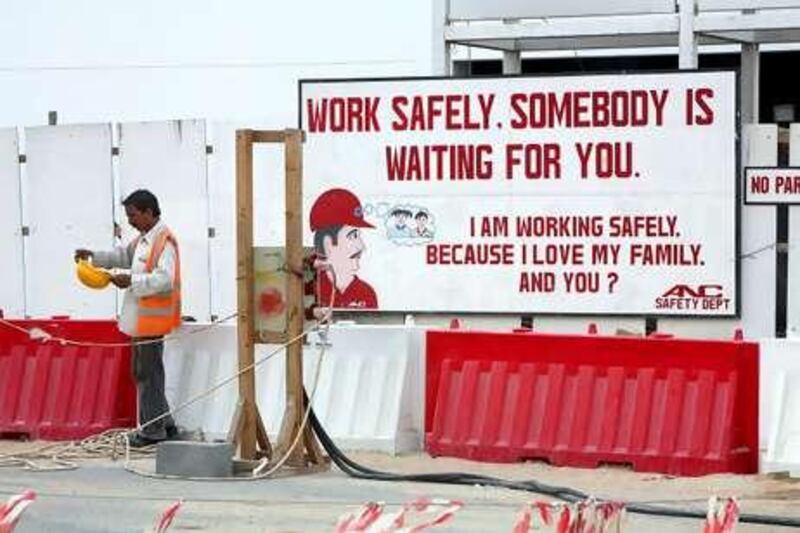One might think safety at work is a given in a modern economy such as the UAE. Butoffice buildings and construction sites can be hazardous, with accidents in the workplace the second most common cause of injury in the country after those on the roads.
To address the problem, an Abu Dhabi organisation and a UK training group are collaborating on awareness programmes and training workshops to encourage companies to make their workplaces safer. While such programmes have long been in place in developed economies, countries in the Gulf are just starting to create them. The key, say the people involved in the latest effort, is policies tailored to try to prevent the most common types of accidents.
In the UAE, the focus is on construction sites. "A lot of accidents are caused by very simple things, slipping and tripping," says Richard Firth, the director of the Institute for Vocational Development, which is part of the Abu Dhabi University Knowledge Group. "It's a real issue and we can do something about it." The first step, Mr Firth said, was raising awareness. That means speaking to construction supervisors about accident-prevention measures such as installing safety barriers and regularly inspecting scaffolding.
The Knowledge Group is a partnership between public and private-sector entities and aims to provide training to individuals, governments and businesses. The partnership, along with the UK safety trainer Advanced Medicine Group (AMG), held day-long seminars for human resources professionals earlier this month to encourage them to create awareness programmes aimed at reducing injuries and deaths at work.
"It's all quite common sense things: wires on the floor; [monitoring] the water machine in the lobby so that the floor doesn't get wet," says Sue Mainey, the vocational development institute's portfolio development director, who ran the seminars. One attendee was Ahmed al Bati, a senior officer for general services at the Abu Dhabi Health Authority (HAAD). Mr al Bati is in charge of workplace safety for the agency and is implementing a variety of programmes, including nominating 37 of HAAD's 350 employees as fire marshals.
"This is very important, especially for the health authority," he says. "We are enforcing others, and how can we be without the state-of-the-art health sand safety standards?" Improving workplace safety is not just about the health of workers; it can directly benefit a company's bottom line, organisers say. That can come through reduced spending on health care and less time spent finding employees to replace those involved in accidents.
Roderick Macdonald, the chief executive of AMG, which is based in Aberdeen, Scotland, says the collaboration is taking an "evidence-based approach", meaning it is using safety statistics on how and why people are injured or die in accidents in the UAE to back up its seminars and pamphlets. For the past three years, HAAD has been compiling statistics by recording all injuries, including those sustained on roads, in workplaces and in households.
Hospital staff log injury details, such as the age and nationality of the patient and the time it takes the victim to get to a hospital, into an electronic system that feeds the information back to HAAD. "We are compiling statistics to develop a knowledge base so we can prioritise where we should allocate our resources and initiatives," says Dr Jens Thomsen, the section head of occupational and environmental health at HAAD.
A study by UAE University last March showed two thirds of all occupational injury admissions at Al Ain Hospital in 2008 were due to falls or falling objects. This time of year, HAAD is busy with its "Safety in the Heat" programme that targets the 800,000 heat-exposed workers at 460 companies in the emirate. The campaign distributes health advice pamphlets and videos in a variety of languages and includes hints for workers fasting during Ramadan.
BuildSafe UAE, a not-for-profit organisation that is also focused on workplace safety, says its statistics show falls remain the most common cause of workplace fatalities and one of the main causes of major injury. In 2008, the organisation recorded 18 construction worker fatalities , six of whom fell to their deaths. The report also listed 651 worksite injuries that caused employees to take time off.
The Knowledge Group's effort complements those sponsored by BuildSafe, which recently started a programme in which "worker champions", chosen by their bosses at five companies across the country, conduct weekly in-house safety inspections. They also give their fellow workers daily briefings on subjects such as first-aid and how to work safely at height. The worker safety programme is the first in a planned series. The Knowledge Group-AMG partnership aims to hold seminars to improve training of first-responders and other medical professionals who see patients prior to arrival at the hospital.
Devising curricula to suit the needs of the UAE's companies and their workers is a unique challenge, Mr Macdonald says. Unlike in other parts of the world, the workforce in the UAE is not a homogenous group. "We rely more on visual aids rather than straight teaching," he says. ashah@thenational.ae






